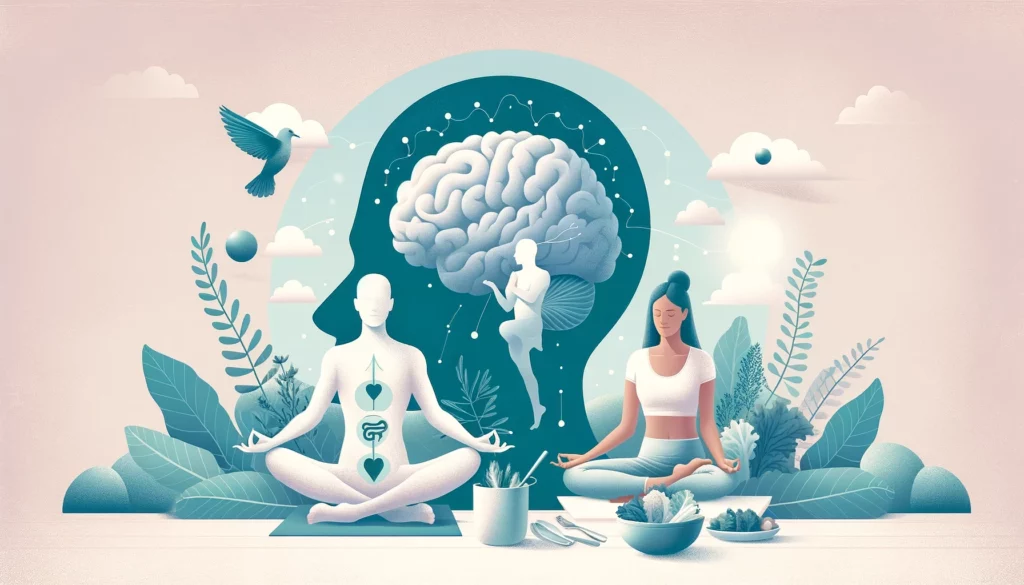The path to optimal health is deeply entwined with the health of our mind and gut. Recent studies have unveiled the gut-brain axis, demonstrating a vital link between our digestive health and emotional state. This exploration highlights the necessity of simultaneously caring for our mental and gut health to cultivate a state of complete harmony. Embracing this interconnectedness is essential for holistic well-being.
Understanding the Gut-Brain Connection
The gut-brain axis is a two-way communication network that connects our brain with our digestive system. This pathway is crucial for keeping us healthy, as our gut health can impact our feelings and how clear we think, and the other way around. Recent studies have shown that having a healthy mix of gut bacteria is important not just for our digestion, but also for feeling mentally well. Our emotions and stress can change the mix of bacteria in our gut, and these bacteria can also influence our mood and actions. Understanding this connection helps us see how important it is to take care of both our mental and digestive health for overall wellness.
The Impact of Gut Health on Mental Wellness
The intriguing world of our gut microbiome holds fascinating secrets to understanding our mental health. This complex ecosystem within our digestive system consists of trillions of microorganisms, including bacteria, viruses, and fungi, which play a significant role in our overall well-being. Notably, the gut microbiome is instrumental in the production of neurotransmitters, the chemicals our brain cells use to communicate. Among these, serotonin stands out; often dubbed the “feel-good” neurotransmitter, a staggering 90% of our body’s serotonin is produced in the gut. This direct link between gut bacteria and serotonin production illuminates the profound influence our gut health exerts on our mood and emotional state. Disruptions in the delicate balance of our gut microbiome can therefore have ripple effects, leading to changes in our mental health, ranging from feelings of well-being to the depths of depression.
Diving deeper into the science, it’s not just serotonin that links our gut to our brain. Other neurotransmitters like dopamine, which is associated with pleasure and reward, and gamma-aminobutyric acid (GABA), which helps control feelings of fear and anxiety, are also influenced by the gut microbiome. This biochemical interplay forms the basis of the gut-brain axis, a two-way communication highway that uses the vagus nerve to relay signals between the gut and the brain. The health of our gut microbiome can enhance or disrupt this communication, affecting not just our mental health but also our response to stress and our ability to process emotional events. Research has shown that a diverse and balanced gut microbiome can strengthen this gut-brain communication, promoting resilience against stress and reducing the risk of mental health disorders.
However, the influence of the gut microbiome extends beyond the production of neurotransmitters. It also plays a crucial role in modulating inflammation, a known factor in many mental health conditions, including depression and anxiety. Chronic inflammation can affect brain function and lead to changes in mood, behavior, and cognitive abilities. By maintaining a healthy gut microbiome, we can help regulate the body’s inflammatory response and protect our mental health. This highlights the importance of dietary choices, as what we eat directly impacts the composition and health of our gut microbiome. Foods rich in fiber, probiotics, and prebiotics can nourish a healthy microbiome, promoting the production of beneficial neurotransmitters and reducing inflammation. Thus, our diet becomes a powerful tool in supporting both our mental and digestive health, showcasing the integral role of gut wellness in maintaining our mental well-being.
How Mental Health Affects Digestive Wellness
The interplay between mental health and digestive wellness is a two-way street; just as gut health can impact our mental state, our psychological state can influence our digestive health. Stress, anxiety, and depression are known to trigger or exacerbate gastrointestinal issues such as Irritable Bowel Syndrome (IBS) and other digestive disorders. The stress response can alter gut motility, increase inflammation, and make the gut more permeable, leading to symptoms like bloating, pain, and discomfort. Recognizing this relationship underscores the importance of managing stress through techniques like mindfulness, meditation, and exercise to maintain a healthy gut. Adopting stress-reduction strategies not only benefits our mental health but also helps prevent and alleviate digestive issues, highlighting the interconnectedness of our emotional and physical well-being.
Emerging alongside the growing understanding of the gut-brain axis is the field of nutritional psychiatry, which explores how our diet directly impacts our mental health through this intricate connection. Nutritional psychiatry suggests that the food we consume can significantly influence the composition of our gut microbiota, thereby affecting our mood and cognitive functions. Studies in this field have shown that diets rich in whole foods, such as vegetables, fruits, and whole grains, which support a healthy gut microbiome, are associated with a lower risk of depression and anxiety. Conversely, diets high in processed foods and sugars, which can disrupt the gut microbiome balance, are linked to increased risks of these mental health issues. This research emphasizes the potential of dietary interventions as part of comprehensive treatment plans for mental health conditions, highlighting the importance of gut health in achieving mental wellness. By integrating principles of nutritional psychiatry into our daily lives, we can make informed dietary choices that support both our mental and digestive health, reinforcing the holistic approach to well-being emphasized throughout this blog post.
Strategies for Enhancing Gut Health

To foster a healthy gut microbiome, incorporating a balanced, fiber-rich diet is key. Foods high in fiber nourish beneficial gut bacteria, promoting diversity and balance within the microbiome. The inclusion of probiotics and prebiotics in the diet supports gut health by enhancing the growth of helpful bacteria. Beyond diet, lifestyle modifications like regular exercise and stress reduction play a significant role in gut health. Simple changes in daily habits can have profound effects on our digestive wellness, illustrating that harmonizing our gut health is both achievable and essential for overall health. Emphasizing the importance of natural, unprocessed foods can further improve gut function and aid in the maintenance of a healthy microbial environment. Additionally, managing intake of irritants such as caffeine and alcohol can help maintain the integrity of the gut lining and support overall digestive health. Engaging in practices that promote relaxation and reduce stress, such as yoga or meditation, can also positively impact gut health by mitigating stress-related digestive issues.
Strategies for Improving Mental Health
Improving mental health means looking at different ways to handle stress, anxiety, and overall well-being. Practices like mindfulness, meditation, and getting enough physical activity are key. Exercise doesn’t just help the body stay fit; it also lifts your mood and helps keep anxiety at bay. Sleep plays a big role too, affecting how well we think and manage our emotions. If you’re dealing with ongoing mental health issues, it’s a good idea to seek help from a professional or consider therapy. These steps offer you extra tools and support to navigate mental health challenges more effectively.
Integrative Approaches to Harmonizing Mind and Gut
For total health, it’s important to look after both your mental and gut health together. Holistic health practices, such as yoga and acupuncture, can improve both your mind and body. They help you relax, cut down on stress, and can even make your digestive system work better. This shows how treating our health as a whole can benefit interconnected systems within us. By embracing these holistic practices, we encourage a well-rounded approach to our well-being. This strategy helps us find balance and health in both our minds and our guts.
The Future of Mind-Gut Research
The exploration of the gut-brain axis is at the forefront of health research, promising to unlock new understandings and treatments for both mental and digestive health issues. The potential for personalized medicine, tailored to individual gut microbiota and mental health profiles, offers exciting prospects for more effective health interventions. As we venture further into this domain, the integration of genomic and microbiomic data could revolutionize how we approach mental and gut health, making treatments more targeted and efficient. This could lead to breakthroughs in preventing conditions linked to the gut-brain axis, such as depression, anxiety, and IBS, by identifying and modifying risk factors early on. Moreover, this ongoing research emphasizes the importance of a holistic view of health, recognizing that the balance between our mental and physical states is key to achieving overall wellness.
Conclusion

The intricate relationship between mental health and gut health is a cornerstone of our overall well-being. By adopting strategies that nurture both, we can achieve a more harmonious and healthy life. This blog post has outlined practical steps and insights into achieving this balance, encouraging readers to embrace a comprehensive approach to health. Let’s commit to supporting both our mind and gut health, recognizing their profound connection and the positive impact this harmony can have on our lives.

